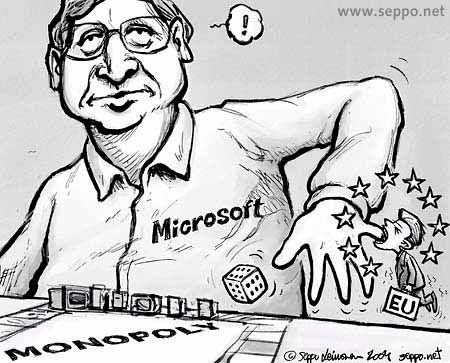


BBC NEWS - Microsoft's EU court battle
The European Commission has fined US computer giant Microsoft for defying sanctions imposed on it for anti-competitive behaviour. Microsoft must now pay 899 million euros ($1.4bn; £680.9m) after it failed to comply with a 2004 ruling that it took part in monopolistic practices. That comes on top of the 497m euros it was fined in March 2004 and a further 280.5m euro fine imposed in July 2006. But as both sides know, more than money is involved in this conflict.
What are the main issues at stake here?
Microsoft abused its virtual monopoly in the computer world to muscle out smaller rivals, especially those that make media players and software for servers. At least, that's the finding of the European Commission's competition watchdog.
Back in 2004, the commission fined Microsoft and forced it to offer a version of its Windows operating system without Microsoft's own media player. The company was also told to give rivals more information about how Windows works, so they can make their own software integrate better with the operating system that runs some 90% of the world's computers. Microsoft agreed, but imposed a high royalty rate on the information, saying it was charging for the innovation involved.
The Commission decided that the rate - initially set at nearly 3% of the licensee's product revenues - was unjustified. That wrangle lasted until October 2007, when the company agreed to reduce the royalty rates. This latest fine is intended to punish Microsoft for non-compliance with the EU ruling up to that time. For the Commission, this has been the granddaddy of all anti-trust cases. The latest fine is a record for a single company, imposed as what EU Competition Commissioner Neelie Kroes calls "a reasonable response to a series of quite unreasonable actions".
Why has the Commission been so determined to pursue this?
Quite simply, both sides have fought this battle tooth and nail. Microsoft refused to accept the 2004 ruling, taking its case to the European Union's Court of First Instance on appeal. However, the court upheld the original decision in September 2007. For its part, the Commission was furious at what it took to be foot-dragging by Microsoft. Ms Kroes said Microsoft was "the first company in 50 years of EU competition policy that the Commission has had to fine for failure to comply with an anti-trust decision".
A number of Microsoft rivals - Oracle, Sun Microsystems, Nokia and IBM among them - had complained to the European Commission that Microsoft was reluctant to share its software code. If they were not told in more detail how Windows worked, they argued, it would be impossible for them to compete with their own software. Ms Kroes said Microsoft had continued to "abuse its powerful market position" after March 2004 and "continued to stifle innovation by charging other companies prohibitive royalty rates for the essential information they needed".
Why did Microsoft keep on fighting?
The company argued that it was entitled to protect its intellectual property. Just because it was big and successful, that did not mean it should have to share all its secrets and innovations with rivals. The company said it had followed all the rules, and that the commission had "erred" in applying them. If the Commission succeeded, said Microsoft, consumers would suffer, because there would be fewer incentives to innovate. Furthermore, consumers demanded "bundled" solutions - all-inclusive software packages that feature basic things such as media players - and did not want the pain of having to download or buy everything separately.
Microsoft now says it is "reviewing the Commission's action", but appears to consider this to be the end of the matter. "The Commission announced in October 2007 that Microsoft was in full compliance with the 2004 decision, so these fines are about the past issues that have been resolved," the firm said in a statement.
___________________________________________________________________
Rob Enderle - http://www.itbusinessedge.com/blogs/rob/?p=149&page=2
Microsoft lost its appeal in the EU. This is potentially a game changer. What it means is a lot of regulatory power just popped up into the software business. The next company likely to be hit by the weapon that was just forged is Apple, though Oracle, IBM, Google and any company that has a strong dominant position assured by proprietary interoperability in a given market could find itself on the wrong side of this thing.
The Trivial Part
The version of Windows without the media player that has been supplied in Europe isn’t selling and the dominant company in the media player space is generally believed to be Apple with iTunes, not the Windows Media Player. For streaming, Adobe Flash is dominant, not Microsoft, and the ruling, and precedent, may actually have an adverse impact on Apple and possibly Adobe in the future. The lasting impact seems relatively minor, where it will only cause Microsoft extra expense but given that most of us download players (Rhapsody, QuickTime, iTunes) anyway, there is no lasting competitive disadvantage.
The Weapon: Interoperability
It’s not just that Microsoft has to disclose and license the core technology that allows Microsoft products to work better with other Microsoft products. It is that the EU wants it to do this for free that makes this a potential game changer. Let’s say you apply the same rule, which is likely, to Apple (which appears to be next in line for this treatment unless it can find a diplomatic way out). The end result is that all of the infrastructure Apple has so painstakingly built (accessories, iTunes, automotive adapters, etc.) now has to be opened up for free to other companies, including Microsoft.
China has already started to illegally clone the iPhone; this could open the door for a way to do much of the same legally. ITunes, which is a reverse razor blade model, now has to support phones from third parties passing all of the benefit (iTunes is basically run at slightly above cost) to the third parties and remove a lot of Apple’s competitive advantage. Think of Google, which has painstakingly created a massive proprietary network of utilities and platforms to manage advertising revenue, having this precedent used against it by a competitor. Certainly it is as dominant in its space as Apple and Microsoft are with MP3 players and operating systems. Now it is too are vulnerable to this new weapon and may find it has to, for free, allow others access to proprietary technology.
Can Microsoft Benefit?
The short answer is yes, but it will depend on how it plays this. While the intent may be to limit Microsoft’s competitiveness, this effectively makes Microsoft’s methods of interoperability into standards and may force Microsoft to supply them at a price that, had it done this without being forced, would have been seen as predatory. The browser is supplied for free and it is basically a super interoperability platform. If we extend that metaphor between platforms, everyone else, to make use of the free code Microsoft will be supplying, has to conform to it. Yes there can be inexpensive clones, but the companies creating them will still have to patch, update and support those clones and will have to either buy from Microsoft or reverse engineer the parts of the cloned product that complete the offering but aren’t provided under this judgment.
That won’t be trivial at all, and at the end of the day, a buyer is going to assume, given it’s Microsoft’s technology, that Microsoft will be best able to deal with it; the buyer will have to go to Microsoft for a roadmap and many compatibility issues — for the most part, anyway. For instance, if you need something fixed so your application will run on a Microsoft platform, it will do you no good to go to a clone company because they don’t own the roadmap for the offering and, if you aren’t buying from Microsoft, Microsoft will probably not alter its product so your application can work better on the clone.
___________________________________________________________________
Sorry to spam you guys with all those articles! This cartoon summarises the gist of it though :

1.4 billion / 26.34 billion (Microsoft's estimated profits of year 2007) is really just a pinky out of the ten fingers of Bill Gates HAHAHA ok one last website if you still have the stamina to read on - http://www.roughlydrafted.com/2007/09/09/microsoftâs-outrageous-office-profits/ basically it's about Microsoft and its competitors.
Don't kill me - Felly
Labels: econs